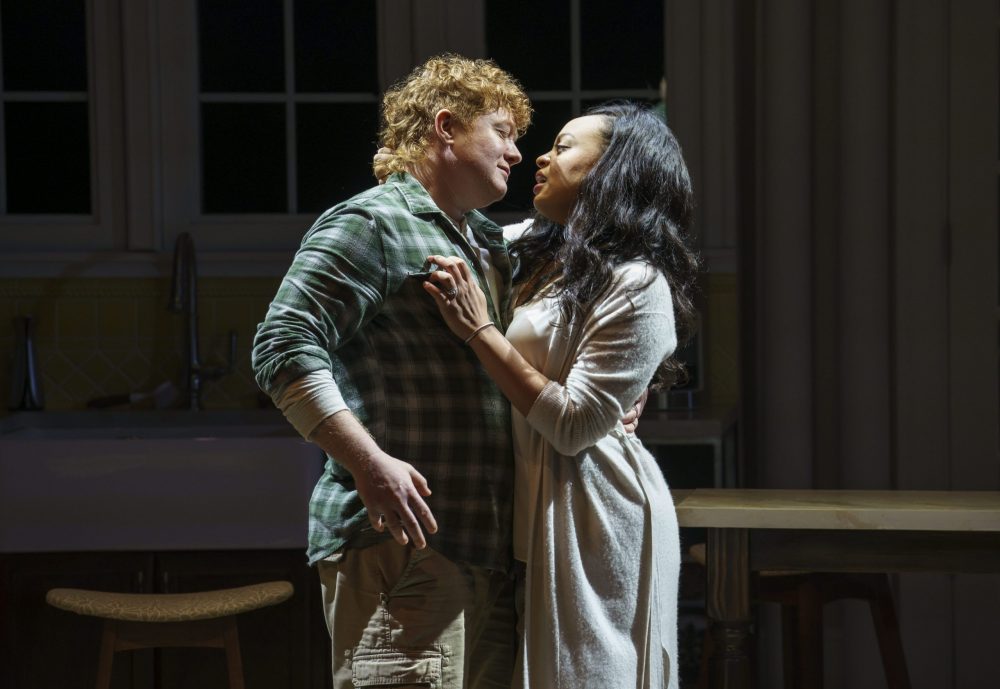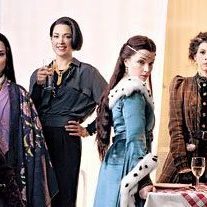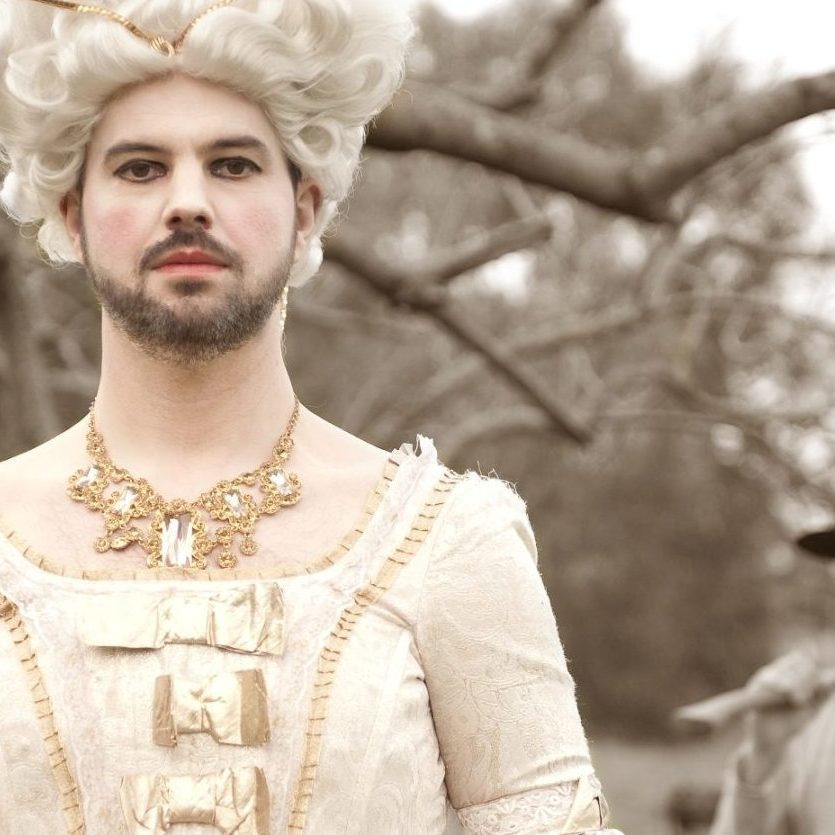
A queer play deals with themes of environmental impact.
What impact do the activities of the human race have on the Earth’s climate? And what role do suburban women play in our acceleration towards environmental disaster? Hurricane Diane—a new play and the first co-production of a two-play collaboration between New York Theatre Workshop and WP Theater—takes us to a well-appointed cul-de-sac in New Jersey where the god Dionysus is working as a landscape gardener with a preference for permaculture.
This incarnation of Dionysus is Diane, “a butch charm factory, with that combination of swagger and stillness particular to masculine-of-center women,” according to the script by playwright Madeleine George. Diane has previously been “living off the grid with a bunch of lesbian separatists in consensus-based community” but now she’s determined to save the world before it’s too late.
Madeleine George tells me that the play was partly inspired after she read The Botany of Desire by Michael Pollan in which she learned that in 1800s America, apple orchards were planted everywhere to make hard cider. George wondered what would happen if “Dionysus came back at this exact moment and if they did, what form would they take?”
Commissioned to write the play by Two River Theater, a New Jersey theatre company shortly after Hurricane Sandy, George wanted to combine two big interests—environmentalism and queer identity—in a “shameless comedy.”
A playwright who was drawn to the theater by its ability to combine the fantastic with intellectual rigor—think Tony Kushner’s Angels in America, which she saw when she was 18—George is convinced that even in the digital age theater’s role is essential in tackling larger social issues. “People crave encounter now more than ever,” she says. “We see that in the way people are taking part in national and global demonstrations, in their desperate attempts to make contact with the natural world with things like ‘forest bathing.’ I have real confidence in theater as a deathless art form. It never goes under. It’s been around for thousands of years now.

“For me, it’s a lifelong project to ask big questions in relation to female and nonbinary environments. It’s a tonic for our culture to see that the larger human questions can be asked and played out in that environment. In other words, a butch lesbian is a person, too.”
In this instance, George’s main question is quite literally: What is the fate of the planet and what are we doing about it? She had been working with the queer writer-performer Becca Blackwell for several years and liked the idea of a play featuring “a butch lesbian hiding in plain sight” in a mainstream suburban environment. George became fascinated with what would happen if she had a charismatic queer woman “show up in a cul-de-sac and slay all the ladies one by one.”
When Blackwell transitioned it added another layer to the character of Diane/Dionysus. George says, “It makes perfect sense; she is exactly the kind of fluid character Dionysus is—they appeared in different forms and guises but always with this mane of curls. There is no one way to be this god. It’s exciting to see Becca Blackwell, who is so defiant about blurring the boundaries of gender, step into the role of a butch woman with such panache and verve.”
The four women Diane “slays” are (mostly) straight, suburban, and susceptible to Diane’s charms but together they represent the idea of community—neighbors who are both competitive with and supportive of each other but whose true natures are only revealed not in the context of shared coffee, wine or cans of Fresca, but when catastrophe strikes. And it does, in the form of a monster storm such a la Hurricane Sandy. What happens to us and to our communities during natural disasters, especially when we are partly to blame for the increasing instability of the natural world and yet we refuse the call to action, resisting change and transformation?
It’s an intriguing premise, especially in our current political climate, which includes calls for more diverse voices on our main stages, including women, queer women, and women of color. There are no villains or bad guys in the play. In fact, there are no guys. Women hold all the cards. “If you want to know what terrible things women are capable of,” says George, “Ask a lesbian. In an all-female world, we run the gamut of human experience, just like men. Women are capable of everything.”
And George has been influenced by do-everything women in her own career and acknowledges those who have “broken such bold ground in terms of theater,” including the WOW Cafe, Split Britches, and the Five Lesbian Brothers. She was also founding member of 13P (Thirteen Playwrights), a now-defunct group of (mostly female) mid-career playwrights who took matters into their own hands by producing, over a period of ten years, one play by each member playwright. Instead of “souring in the brine of bitterness,” says George, she spent her time “lifting up the work of my friends.”
She’s found a worthy collaborator in acclaimed director Leigh Silverman, too. Silverman is an out lesbian director and George sings her praises. “Leigh is a chameleon genius of a director, passionately devoted to writers. The point of a collaboration is to create a mind meld. She has an ability to get inside your head and bring out what it is you’re trying to do. It’s a delicious joy to work with someone who shares a shorthand: what’s sexy, what’s not sexy; what funny, what’s not funny. And that possible partly because we’re standing on the same side of this [lesbian] identity.”
But there’s still a dearth of female and queer theater projects and “discrimination against queer women at the level of the gatekeepers is real,” says George. Which is why a play like Hurricane Diane is such a rare an important event in New York theater. And if you’re an LGBT playwright struggling to be heard and seen, consider finding others like yourself and making your own opportunities. And find ways to keep your identity and what interest you front and center.
George’s script states that “Diane may be played by any masculine person who does not identify as male.” And the night I saw the play this was not a concept that flummoxed the audience at all. Everybody had an uproariously good time.
“To give the play a queer narrative seemed like an obvious twist. Almost all of my plays have some lesbian or queer content,” says the Pulitzer Prize for Drama-nominated George. She is confident that theatre people these days are “conversant with a spectrum of identity” and will embrace Hurricane Diane (they have; the play’s run has been extended). Its explorations of gender and sexuality aside, it is very entertaining and satirizes everything from HGTV and its suburban aspirations to “real housewives” as well as tropes of Sapphic seduction. So enjoy the spectacle of four women and one gender-nonbinary demigod ruling the roost for this rare occasion. Diane says, “They’re a little bit of a workout, these ladies, am I right?” Yes, they are!


